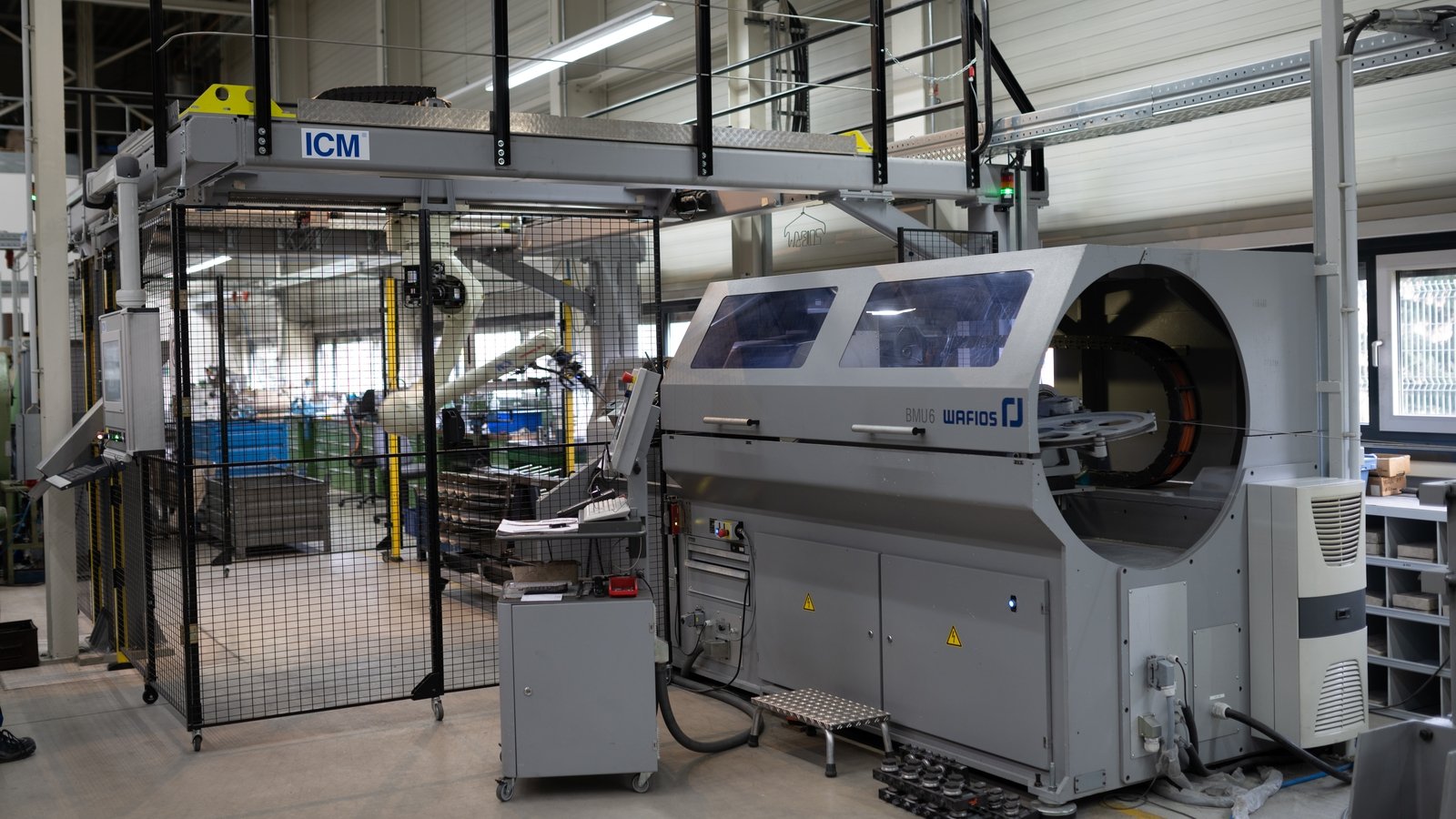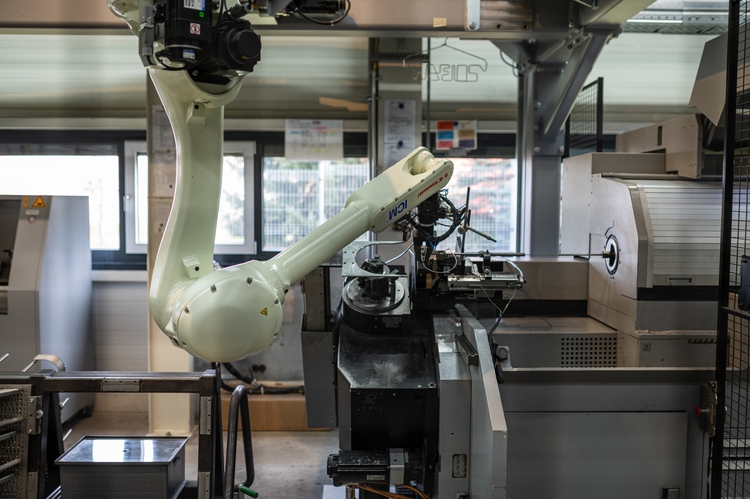
Bahner and Schäfer integrate robots into production
Automation of a traditional Saxon company
Jun 21, 2023 — Small and large series are covered by Bahner and Schäfer as well as single pieces and prototypes - in numerous variants and made of different spring steel types. With a new robot cell from ICM built around a Kawasaki robot, the traditional company is getting ready for the future.
The robot system developed by ICM around a Kawasaki Robotics RS010L ensures higher production, maximum quality and reduces the workload of the employees. © Kawasaki
Since its foundation in 1931, the Saxonian Bahner und Schäfer GmbH has been producing technical springs and bent parts for numerous industries in the third generation. In two production halls at the Oelsnitz site, the family-owned company manufactures components for customers throughout Europe and North America, always precisely tailored to individual requirements and special applications. Small and large series are covered by Bahner and Schäfer as well as single pieces and prototypes - in numerous variants and made of different spring steel types. With a new robot cell from ICM built around a Kawasaki robot, the traditional company is getting ready for the future.
Managing Director Tabea Schäfer, who has been responsible for the technical springs division since taking over the company in 1993, is focusing on automation and technical innovations in order to promote the long-term growth of her company. Thus she decided early on to focus primarily on small and medium-sized series in order to be able to supply small and medium-sized customers flexibly and precisely.
A personal relationship with her customers and fast response times and deliveries have proven to be key factors for Tabea Schäfer's success from the very beginning.
For a long time, some production processes were still carried out manually by the employees at Bahner and Schäfer, such as subsequent chamfering or the individual positioning of parts for subsequent heat treatment. This procedure not only required more time and money, but also always presented the risk of deformation.
Automation: The choice fell on ICM and Kawasaki Robotics
For Tabea Schäfer it was clear for a long time that something has to happen. The challenges have changed rapidly over the years, today automation is an important factor to meet the demand and special requirements of customers from many industries.
This line with six Stericlean robots processes humane hip bones to cuboid implants.
At the opening of the SME 4.0 Competence Center in Chemnitz, she came into contact with ICM on the recommendation of other companies and was quickly convinced. The ICM - Institut Chemnitzer Maschinen- und Anlagenbau e.V. is a non-profit research institute for innovations and system solutions in mechanical and plant engineering, with a special focus on small and medium-sized enterprises. Although three other suppliers were also guests at Bahner and Schäfer, ICM was able to score points above all with its broad expertise in various fields, says Schäfer: "Our project was complex and not all developments could be planned in advance from the outset. We don't have our own in-house engineer, so it was all the more important for us to have a qualified contact person who not only tells us how it's done, but also receives, checks and implements our ideas in a targeted manner. The combination of ICM and Kawasaki Robotics was therefore exactly right for us".
The premise of the search for an automation solution was and is simple: more flexibility.
"The bending machine for production is flexible, so the robot system must be too," says Schäfer.
Requirement: Increased production and relief for the employees
Before the first robot came along, there were concerns among the staff, but for Tabea Schäfer it was clear: "If we miss the opportunity to automate now, we might not have any orders in 10 years because we will be too expensive then. That way we will remain future-proof in the long term". The employees' worries quickly disappeared and the benefits became clear: the growing number of new jobs could be handled without pressure, and automation provided the necessary breathing space.
In addition to relieving the strain on the employees, automation also had another important task to accomplish: After reunification, many older employees with a great deal of specialist knowledge were hired, who are now gradually retiring. The generation change that took place in this way brings many young employees who value family-friendly working hours. The use of the robot system provides the necessary planning and automatic scalability of production.
Challenging, but successful: The implementation of the system
After the decision for ICM and Kawasaki Robotics was made, the implementation started promptly. The project turned out to be challenging, but due to a close and flexible cooperation it could be implemented in a timely manner.
"The planned robotic cell had to integrate itself not only into the available space, but also into the already established process chain - flexible and easy to operate," says Anton Ivanov, ICM project manager. At the center of the system: the Kawasaki Robotics RS010L. The RS010L is part of the universal R series for small to medium payloads, suitable for assembly, material handling, machine loading and many other applications. It has a maximum load capacity of 10 kg and a reach of 1,925 mm. Its special design enables the high-speed robot to have a longer reach and an extended working range.
The system automates the previously manually executed separation process of the bent parts, which at times was performed by up to 4 employees: The RS010L robot removes the parts from the bending machine and feeds them to a register for suspension or to an ICM designed end finishing machine - precisely and without unnecessarily bending or jamming the parts. An X/Y linear axis system with 3x2 m travel gives the robot, which is installed on the ceiling, additional room to move and acts as a seventh and eighth axis. "The design of a stiff portal as a three-legged construction was very challenging, as a classic four-legged portal was out of the question under the given installation conditions. Its vibration behavior was optimized using modern FEM simulation," says Anton Ivanov. Since flexibility plays a key role and the system has to be adapted quickly to different bent parts and materials, the robot can automatically pick up the appropriate gripper at a tool change station - ICM relies on gripping systems from the specialist Zimmer Group.
Conclusion of the new system after one year of operation
After its commissioning in April 2019, the new plant was able to quickly optimize production through automated handling: The number of pieces produced is significantly higher, and if necessary, night-shift operation is also possible without any problems, thus allowing for much more flexible production. "Previously, there was no shift work at Bahner and Schäfer, but the robot offers the necessary flexibility and can, for example, completely automatically handle its own shift. Furthermore, the system frees the workers from monotonous work and the production assistants can devote themselves to numerous other tasks," explains Marcel Ott, who is in charge of software development for the project at ICM.

The system can be adapted for new parts in less than 15 minutes. This means that Bahner and Schäfer can change over production in the shortest possible time. The system around the Kawasaki Robotics RS010L also ensures consistently high quality: the deformations of the bent parts that often occur in manual operation are a thing of the past.
"All information on the status, the current workload and the current cycle can be read out and visualized at any time. This means the system can also run overnight or over the weekend - with a full overview," says Marcel Ott.
The robotic cell can be adapted to new productions in the shortest possible time thanks to a quick gripper change and the possibility of attaching different parts.
The first step of automation is done - what's next?
The automation at Bahner and Schäfer continues to progress: Tabea Schäfer and her team are planning to map even more applications with the existing Kawasaki robot - this is how the investment already made is to be optimally utilized. In addition, in the future especially younger employees of Bahner and Schäfer will be trained in the handling and programming of the robot.
The demands on production are also growing: in the future, even more complex bent parts and springs are to be produced, and more often small quantities of individual parts. There are also already plans to use robots on other machines for removal in the long term - for example, for the post-processing of tension springs for reworking. When it comes to automation, the traditional company is taking a step-by-step, but long-term and continuous path.


